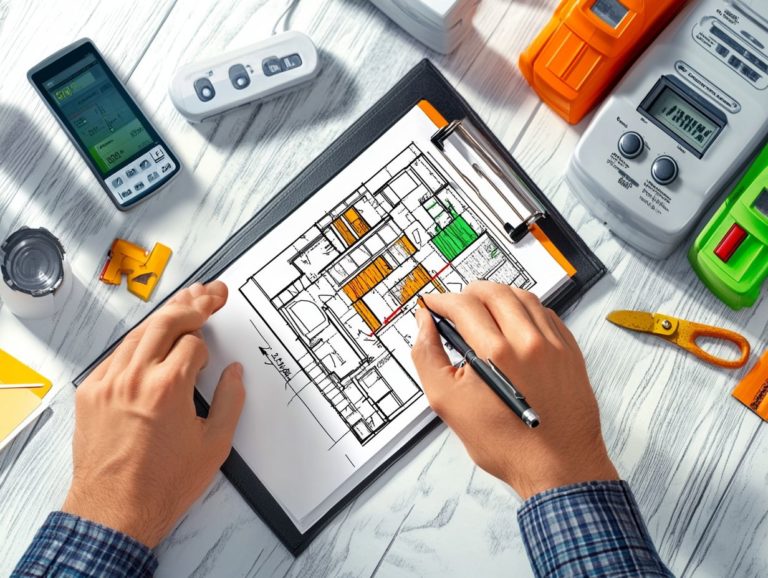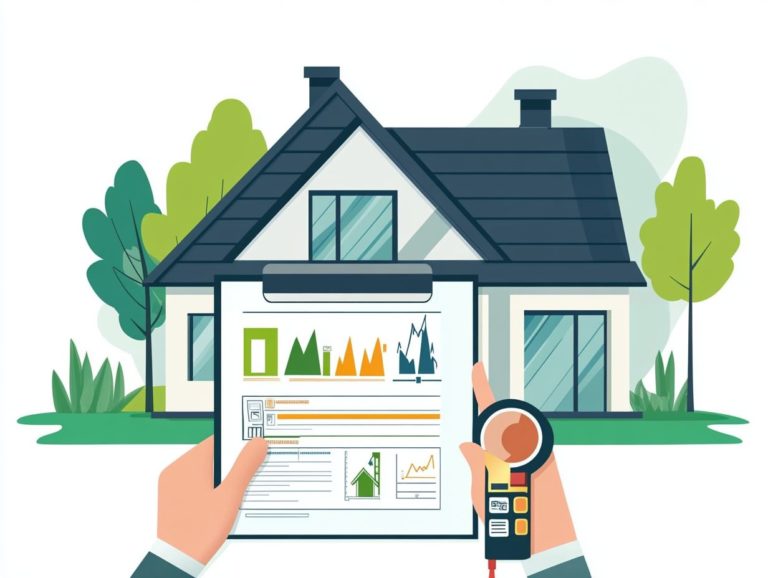Understanding the Cost-Benefit of Energy Audits
Energy audits are crucial for anyone aiming to enhance energy efficiency, whether in a residential space or a business environment.
They provide insight into how energy is used and pinpoint opportunities for substantial savings. This article delves into what energy audits are, their purpose, and discusses the associated costs while underscoring the potential advantages for both your finances and the environment.
It also outlines the different types of audits available and offers valuable tips on how to prepare for one. Explore how an energy audit can revolutionize your energy management strategy.
Contents
Key Takeaways:

- Energy audits provide a comprehensive assessment of energy usage and potential savings, helping individuals and businesses make informed decisions about energy consumption.
- The cost of energy audits varies based on factors like the size and complexity of the building, but the potential benefits make it a worthwhile investment.
- Energy audits not only help save money but also reduce carbon footprints and contribute to a more sustainable future.
What is an Energy Audit?
An energy audit serves as a thorough examination of your facility’s energy usage, tailored to uncover opportunities for energy savings and enhance overall efficiency.
It evaluates multiple parameters, such as HVAC systems, lighting, and insulation, all while adhering to the guidelines for energy management to ensure best practices.
The audit process includes a meticulous analysis of energy usage, offering you actionable insights that can lead to substantial reductions in operational costs and the carbon footprint of your buildings. By systematically assessing energy performance, your organization can implement sustainability initiatives that not only conserve energy but also prolong the life of your equipment.
Definition and Purpose
The primary purpose of an energy audit is to analyze your building’s energy performance and identify areas where you can enhance energy efficiency. By conducting a thorough examination, you can choose from various types of energy audits such as walk-through, diagnostic, and investment-grade audits that provide tailored insights to significantly improve your overall energy consumption.
These evaluations utilize energy monitoring tools and advanced energy modeling software to pinpoint inefficiencies and recommend actionable solutions. The audits are essential for implementing sustainability measures, allowing you to reduce operational costs while also making a positive contribution to environmental conservation.
Ultimately, the findings empower you to make informed decisions that support long-term energy savings and foster a more sustainable future.
The Cost of Energy Audits
The cost of energy audits can fluctuate considerably, influenced by various factors such as the size of your facility, the nature of the audit performed, and the specific energy utilities at play.
Factors that Affect Cost
Several factors will influence the cost of your energy audit, including the complexity of your facility, your existing HVAC systems, and the depth of analysis you require.
For example, if you own a larger building with intricate layouts, you might find that a more extensive assessment is necessary, which could drive up costs. The audit’s scope whether you need a full evaluation of all energy-consuming systems or just a targeted examination can also significantly impact pricing.
Moreover, advanced technology such as thermal imaging cameras and energy management software plays a pivotal role in enhancing the accuracy of your findings. These tools allow you to assess energy performance by pinpointing inefficiencies in systems like lighting, insulation, and heating.
By leveraging this technology, you can develop comprehensive recommendations tailored to optimize energy usage and reduce operational costs effectively.
Don t wait! Start your journey towards energy efficiency today!
Potential Savings from Energy Audits

Implementing the recommendations from an energy audit can lead to big savings on energy bills. Over time, this proactive step often pays off through improved efficiency and lower utility costs.
By focusing on energy conservation strategies tailored to your needs, you can achieve impressive return on investment while enhancing sustainability measures. These audits are invaluable for identifying performance improvements that minimize waste and contribute to a greener footprint.
The cost-benefit analysis makes it clear: investing in an energy audit is not just an expense; it’s a strategic long-term solution that promotes both economic and environmental stewardship, especially when considering the cost-benefit of insulation.
Benefits of Energy Audits
Energy audits can unlock amazing benefits for you, including improved energy savings and decreased operational costs. Together, these benefits help you achieve a reduced carbon footprint for your facilities.
Environmental Impact
Energy audits are essential for promoting environmental sustainability by identifying areas of energy waste. They recommend effective conservation strategies that are invaluable for both businesses and homeowners.
These assessments guide you toward energy-saving initiatives that cut costs and significantly reduce your carbon footprint. By uncovering inefficiencies in energy usage, these audits empower you to make informed choices about your consumption.
Embracing these measures nurtures a culture of sustainability, inspiring wider engagement in efforts to conserve resources and minimize environmental impact. Ultimately, the insights gained from energy audits can lead to impactful changes that benefit both the planet and your bottom line.
Financial Benefits
The financial advantages of energy audits are substantial, offering you the opportunity to lower costs through strategic energy savings. Understanding the purpose of energy audits helps these assessments analyze your energy performance and pinpoint inefficiencies that might otherwise escape your notice.
By implementing the recommended energy efficiency measures, you can significantly reduce utility bills, enhancing your overall financial health. While the initial investment in an energy audit may seem daunting, it often leads to considerable long-term savings.
A thorough cost-benefit analysis reveals immediate savings and indirect benefits, such as increased property value and reduced maintenance costs. Maximizing efficiency leads to sustainable profits for your enterprise.
Ready to see how much you can save? Schedule your energy audit today!
Types of Energy Audits
Energy audits come in various forms, including residential, commercial, basic, and comprehensive audits. Each audit is designed to meet distinct needs and objectives.
Understanding these categories allows you to select the most appropriate audit for your specific circumstances.
Residential vs. Commercial

Residential and commercial energy audits are not created equal; they differ in scope and methodology, each addressing unique aspects of energy efficiency and consumption.
In a residential context, these assessments focus on single-family homes or multi-unit dwellings. They analyze energy systems like HVAC units, insulation quality, and appliance efficiency, tailored to the home environment.
Commercial audits cover a broader spectrum of facilities, from office buildings to industrial spaces. They require a comprehensive evaluation of intricate energy systems like centralized heating and cooling systems.
These commercial audits often dive deeper into preventive maintenance practices, ensuring that HVAC systems operate at peak efficiency to minimize waste and cut costs.
By pinpointing areas for improvement specific to each facility type, both residential and commercial audits can greatly enhance overall energy conservation strategies.
Basic vs. Comprehensive
Basic and comprehensive energy audits serve different purposes. A basic audit provides quick assessments, highlighting obvious waste and giving you an overview of your energy use.
A comprehensive audit, however, goes much deeper. It uses detailed energy modeling and advanced monitoring to give you a clearer picture of your energy performance.
A basic audit aims to find immediate savings with little disruption. This makes it perfect for smaller facilities or those looking for fast fixes.
A comprehensive audit focuses on identifying complex issues affecting overall energy performance. It aims to foster long-term improvements for sustainability.
The results of these audits can vary greatly. Basic assessments suggest simple changes you can make right away, while comprehensive evaluations lead to strategic energy management plans.
These plans address the root causes of waste and use advanced technology. Ultimately, they can lead to significant savings and better operational efficiency.
How to Prepare for an Energy Audit
Preparing for an energy audit requires careful planning. As a facility manager, gather all necessary data to enable a smooth audit process.
This proactive approach sets you up for effective evaluation and energy optimization.
Steps to Take Before an Audit
Before starting an energy audit, take key steps for a seamless process. Focus on thorough data collection and preliminary assessments.
- Gather utility bills from the past year. They provide insights into your energy use and costs, and can reveal unusual patterns.
- Analyze historical energy use to compare your current performance with previous years. Spotting trends can indicate areas of waste.
- Identify specific areas of concern like old equipment or poor insulation. These factors can significantly affect your facility s energy efficiency.
What to Expect During an Audit
During an energy audit, expect a structured process assessing various systems in your facility. Qualified professionals will start with a walkthrough, examining your heating, ventilation, and air conditioning (HVAC) systems for inefficiencies.
They will use methods like thermographic inspections and air leakage tests to collect data on energy use. Evaluating equipment performance can reveal opportunities for maintenance, leading to substantial energy savings.
The audit also includes analyzing utility bills and comparing historical data to identify areas for improvement. This focus on sustainable practices results in actionable recommendations for optimizing energy management.
Frequently Asked Questions

What is an energy audit and why is it important?
An energy audit is a detailed assessment of how a building uses energy. It helps identify waste and provides solutions to improve efficiency, which can save money on energy bills.
How does an energy audit work?
An energy audit typically involves inspecting a building’s energy systems, including lighting, HVAC, insulation, and appliances. Data is collected through measurements and interviews with occupants, identifying areas for improvement.
What are the benefits of getting an energy audit?
An energy audit can save you money on energy bills and make your home or office more comfortable. It also spots safety risks and can extend the life of your energy systems.
How much does an energy audit cost?
The cost varies based on building size and location. Typically, a residential audit costs between $300 and $800, while a commercial audit may run several thousand dollars.
Can I conduct an energy audit myself?
You can find DIY energy audit kits, but hiring a professional is best. They have the training and tools to give you a thorough assessment.
What can I do with the results of an energy audit?
The results help you focus on energy-saving improvements. You can implement recommendations to lower your bills and reduce your carbon footprint. Some energy companies even offer rebates for these upgrades!






